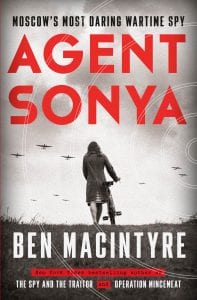By Leah S. Dunaief

For some reason, this book tickles me, maybe because of the ending. And maybe because I am always interested in how women manage to balance being a wife, mother, housekeeper and cook with a demanding job outside the home. I haven’t read the book yet, only the review, but that was enough to hook me.
The book is Agent Sonya by Ben Macintyre, and yes, it is a spy story. The reviewer, Kati Marton, writing in the Book Review section of the Sunday New York Times, calls the author “John le Carre’s nonfiction counterpart.” The main character in the book, Sonya, is based on a real person, Ursula Kuczynski. Born in a prosperous, bourgeois German family, she suffered a blow from a policeman’s rubber truncheon when she was 16 and participating in a street demonstration in the 1920s as Nazis and Communists brawled. It was enough to cause her to sign up with the Communists, who were the only ones apparently willing to shed blood in fighting the Nazis. She was further seduced by their promise of a workers’ utopia.
Her story, a “panoramic account of espionage from Weimar Germany through the Cold War is, above all, a woman’s story.” It is based on Sonya’s own journals, in which she captures “the stressful balancing act of spymaster, mother and lover of several men during the most dangerous decades of the 20th century. Like many supremely successful women, Sonya benefited from men underestimating her.” And by the way, the name, Sonya, means dormouse in Russian.
Are you hooked yet?
 The scene shifts from Chiang Kai-shek’s Nationalists and Mao Zedong’s Communists to Japanese-occupied Manchuria, to the bucolic Cotswolds of England, where she lived during much of WWII as a housewife and mother. In addition to caring for a husband (who was himself a lower level spy with no idea of his wife’s top level position) and two children, she managed spy drops and transmitted coded messages as an expert radio operator and in Morse code, all the while eluding the German, British and American secret services hunting for her. Without ever wearing a military uniform, she held the rank of colonel in the Soviet army. “Domesticity was the perfect cover,” according to reviewer Marton.
The scene shifts from Chiang Kai-shek’s Nationalists and Mao Zedong’s Communists to Japanese-occupied Manchuria, to the bucolic Cotswolds of England, where she lived during much of WWII as a housewife and mother. In addition to caring for a husband (who was himself a lower level spy with no idea of his wife’s top level position) and two children, she managed spy drops and transmitted coded messages as an expert radio operator and in Morse code, all the while eluding the German, British and American secret services hunting for her. Without ever wearing a military uniform, she held the rank of colonel in the Soviet army. “Domesticity was the perfect cover,” according to reviewer Marton.
Sonya was right up there at the top of intelligence gathering. She was the spymaster to pass along secrets about the atom bomb from brilliant German theoretical physicist Klaus Fuchs. Fuchs worked in Britain and Canada and ultimately at Los Alamos, and she was his handler, sending critical information to Stalin and the Soviet Union. Throughout the war, Fuchs played a seminal role in helping to develop the powerful new weapon. He ultimately confessed to the British to having spied for the Soviets and served a nine-year sentence there, then promptly emigrated to East Germany.
The reviewer delights in descriptions of the flat-footedness and sexism of the British secret services as revealed in the book. Only one member of British M15 “smelled a rat” regarding the Cotswolds “housewife,” another woman, Millicent Bagot. “But her less shrewd (male) colleagues prevented [Bagot] from bagging her prey.” Sonya was interrogated twice inconclusively in 1947 by British intelligence agents. Years later, she was dubbed by the media as “Stalin’s
best spy.”
Sonya too spent the Cold War years in East Germany, leaving England the day before Fuch’s trial began. He did eventually unmask her. And this is the part that tickles me the most. She became an author, assumed the pseudonym of Ruth Werner, and wrote knowingly about spy adventures. Her books became best sellers. She died in Berlin in 2000 at age 93.
Almost all the spies she worked with were caught at some point, but she survived two intense decades, the 1940s and 50s. She led a fascinating life and was clearly exceptionally intelligent. The only pity is that she worked on the wrong side of history, believing in an ideology that was made up of lies.





